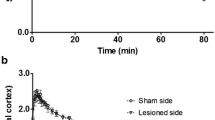Abstract
The role of serotonin (5-HT) and its interaction with the muscarinic or nicotinic receptor-mediated mechanisms in the modulation of working memory and motor activity was investigated by assessing the effects of 5-HT lesion and cholinergic receptor blockade on the performance of rats in a working memory (delayed non-matching to position, DNMTP) task. A global serotonergic lesion was induced by the intracerebroventricular adminstration of 5,7-dihydroxytryptamine (5,7-DHT). Post-mortem neurochemical analysis revealed that serotonin and 5-hydroxyindoleacetic acid (5-HIAA) levels were reduced in frontal and parieto-occipital cortices and in hippocampi of 5,7-DHT lesioned rats. 5-HIAA levels were also reduced in striatum. 5,7-DHT lesion slightly impaired choice accuracy of rats in the DNMTP task and also transiently reduced motor activity in rats. Even the lower dose of scopolamine (0.075 mg/kg), a muscarinic receptor antagonist, impaired the choice accuracy already at the shortest delay (i.e. not indicative of a working memory impairment per se), and caused a marked disruption of motor activity (lengthened response latencies, increased probability of omissions and decreased trials completed). Furthermore, the quaternary analogue, N-methylscopolamine (0.150 mg/kg), affected the motor activity of rats to the same extent as scopolamine. Mecamylamine (1.0; 3.0 mg/kg) also interfered with motor activity and it slightly decreased the choice accuracy, which was not dependent on the delay. Although mecamylamine disrupted the performance of rats in the DNMTP task, the disruption was not as severe as that seen with scopolamine. Moreover, both scopolamine and mecamylamine augmented the slight impairment on the choice accuracy of 5,7-DHT lesioned rats, but this was non-mnemonic in character. We conclude that there is no evidence for any major interaction between the serotonergic system and muscarinic or nicotinic cholinergic mechanisms in working memory per se, but muscarinic and nicotinic receptor antagonists may act additively with the 5,7-DHT lesion to disrupt the choice accuracy of rats.
Similar content being viewed by others
Author information
Authors and Affiliations
Additional information
Received: 22 November 1995 / Final version: 25 November 1996
Rights and permissions
About this article
Cite this article
Ruotsalainen, S., MacDonald, E., Miettinen, R. et al. Additive deficits in the choice accuracy of rats in the delayed non-matching to position task after cholinolytics and serotonergic lesions are non-mnemonic in nature. Psychopharmacology 130, 303–312 (1997). https://doi.org/10.1007/s002130050244
Issue Date:
DOI: https://doi.org/10.1007/s002130050244




